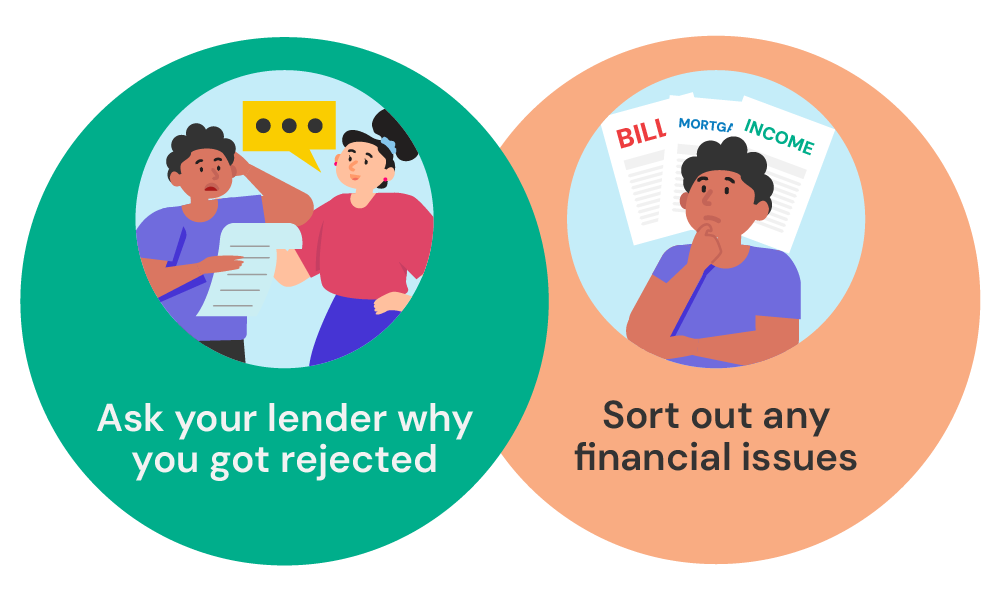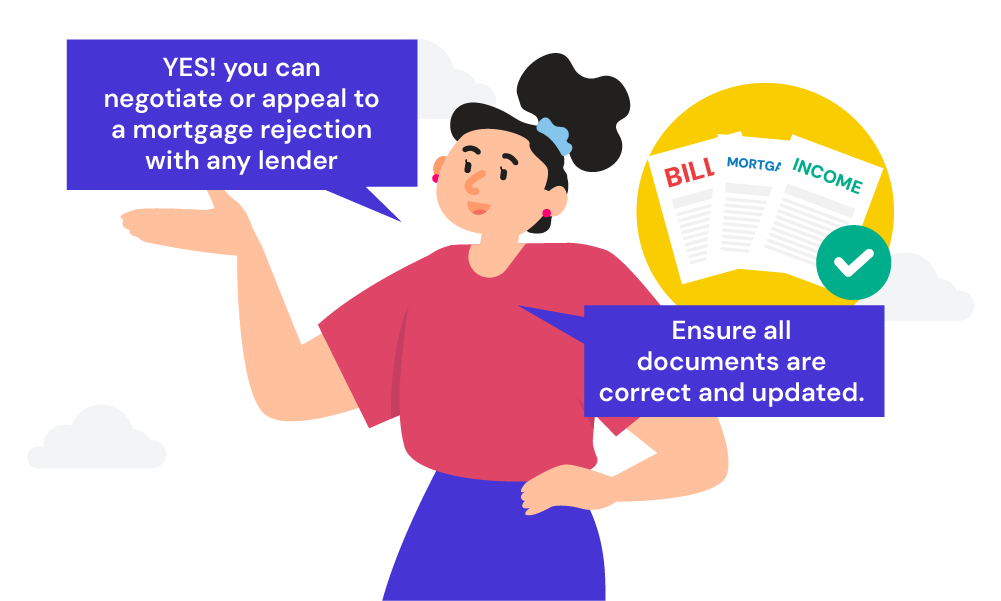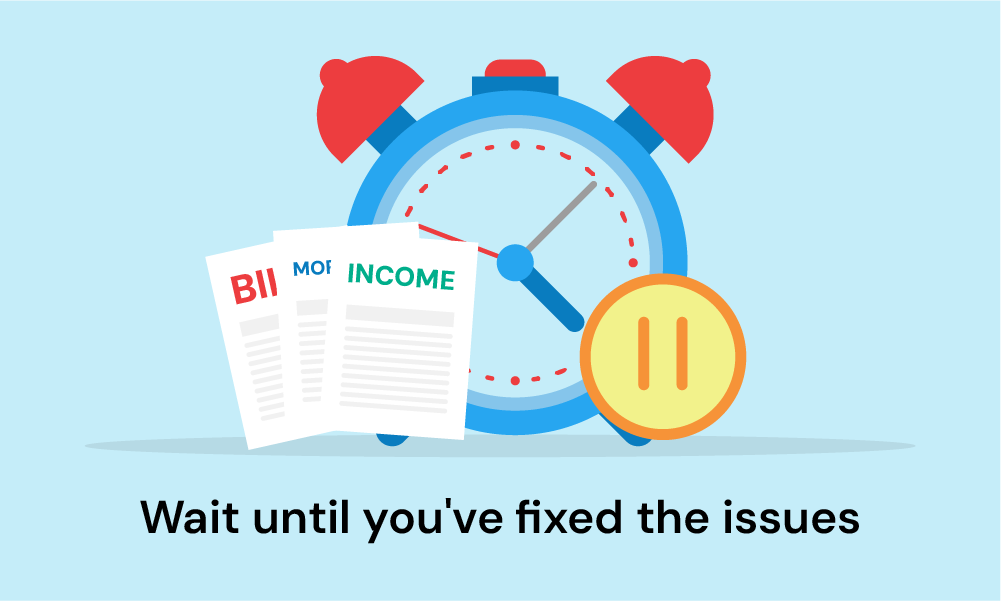- How Strict is HSBC in Assessing Mortgage Applications?
- What is the Expected Timeframe for HSBC Mortgage Processing?
- Steps to Take Following a Mortgage Refusal from HSBC
- Is There a Possibility to Contest HSBCâs Mortgage Decision?
- Typical Reasons for HSBC Mortgage Application Declinations
- Reapplying for a Mortgage: Timing and Preparation
- The Bottom Line
What To Do If HSBC Declined Your Mortgage Application?

Getting a ‘no’ from HSBC on your mortgage application can be a real downer.
You’ve probably been dreaming about moving into your place, picturing every detail, from the colour of the curtains to the layout of the furniture.
Then, suddenly you received the news that your application was declined. We understand how confusing and concerning this can be, but don’t lose heart.
Learning why HSBC might have turned you down is the first step to turning things around.
In this guide, we’ll explore why HSBC might say no to a mortgage application and what you can do to improve your chances in the future.
How Strict is HSBC in Assessing Mortgage Applications?
HSBC is known for being thorough and meticulous. They have a responsibility to ensure that they lend money responsibly.
This means that every application they receive goes through a detailed assessment process. HSBC scrutinises your financial history, employment status, credit score, and current debts.
The bank wants to be sure that you can manage the mortgage repayments comfortably without stretching your finances too thin.
HSBC’s evaluation process is particularly focused on the stability of your income. This is especially true if you’re self-employed or have a fluctuating income.
They need to be confident that you can keep up with your mortgage payments in the long run. For first-time buyers, HSBC offers specific products and support, understanding that stepping onto the property ladder is a big move. They aim to make this journey smoother and more accessible for new entrants to the housing market.
For self-employed individuals, HSBC’s approach is a bit more rigorous. They usually ask for a more extensive financial history.
This is because they want to see a consistent and sustainable income, ensuring that even with the ups and downs of self-employment, you can maintain your mortgage payments over time.
What is the Expected Timeframe for HSBC Mortgage Processing?
Typically, HSBC processes mortgage applications within 2 to 4 weeks. However, this timeframe isn’t set in stone. The duration can vary depending on several factors that are unique to each application.
The complexity of your case can affect how quickly HSBC processes your mortgage. If your financial situation is straightforward, you might find that things move quite swiftly.
On the other hand, if you have a more complex financial background, like irregular income or self-employment, it might take longer.
Other factors that can extend the process include issues found during the property’s valuation or legal checks, or if HSBC needs additional documentation from you.
Steps to Take Following a Mortgage Refusal from HSBC
Being declined for a mortgage by HSBC can be disappointing, but it’s not the end of the road. Here’s what you should do next:
Firstly, try to find out why HSBC declined your application. This information is crucial as it guides what you need to do to improve your chances next time. HSBC should provide you with the reasons for their decision.
It could be related to your credit history, income stability, or something specific about the property you want to buy.
Once you understand why your application was declined, you can start addressing these issues.
If it’s about your credit history, look into ways to improve your credit score. If your income was the issue, you may need to reassess your budget or look for a less expensive property.
If the problem was with the property itself, you might need to consider other properties or address the specific issues raised.
Remember, a mortgage refusal isn’t a permanent ‘no’. It’s a chance to reassess and come back with a stronger application. Taking these steps can put you in a better position for when you’re ready to apply again.

Is There a Possibility to Contest HSBC’s Mortgage Decision?
The good news is, yes, it is possible to appeal against a mortgage decision made by HSBC. However, the success of your appeal depends on certain factors.
To start an appeal, you need to have a solid basis for it. This means you should appeal if there has been a misunderstanding or if HSBC based their decision on information that wasn’t accurate or up-to-date.
For instance, if there have been recent positive changes in your financial situation that weren’t considered, or if there were errors in your credit report, these are valid grounds for an appeal.
The process for appealing involves contacting HSBC directly and presenting your case. It’s important to provide clear and compelling evidence to support your appeal.
This could be updated financial statements, evidence of error correction in your credit report, or any other relevant documentation that supports your case.
Remember, an appeal isn’t just about saying you don’t agree with the decision. It’s about showing HSBC new or corrected information that could change their view.
It’s vital to understand why your application was declined in the first place, so make sure to ask HSBC for detailed feedback. This will help you address the specific issues in your appeal.

Typical Reasons for HSBC Mortgage Application Declinations
When applying for a mortgage with HSBC, it’s essential to understand that certain factors can lead to a decline in your application.
Knowing these reasons in detail can help you better prepare and possibly avoid the disappointment of a refusal.
Affordability Criteria
One of the key factors HSBC considers is how much they can lend you based on your salary. The bank generally offers mortgages up to 4.49 times your annual income.
This means if you’re hoping to borrow more than this ratio allows based on your earnings, your application may not be successful. It’s crucial to assess your affordability realistically before applying.
Credit History Assessment
HSBC takes a close look at your credit history. They are particularly cautious about certain negative credit events.
If your credit report shows recent significant issues like a County Court Judgment (CCJ) within the last 36 months, existing debt arrears, or bankruptcy declared in the past three years, these can be grounds for immediate rejection.
It’s vital to review your credit report for any such issues and address them wherever possible before applying.
Property Evaluation
The bank also assesses the property you intend to buy.
If the valuation report reveals issues such as non-standard construction types (for example, single-skin construction) or environmental concerns (like land contamination), HSBC may see these as red flags.
The bank aims to ensure that the property is a secure and valuable investment before approving a mortgage.
Self-Employment Income Evidence
For self-employed individuals, proving income stability is key. HSBC typically requires at least 12 months of financial records to consider your application.
This is to verify a stable and reliable income stream, which is crucial for loan approval.
Non-acceptance of Guarantor Mortgages
HSBC currently does not offer guarantor mortgages. If your application relies on having a guarantor to secure the loan, it’s likely to be declined.
Understanding the types of mortgage products HSBC offers and their criteria can save you time and effort.

Reapplying for a Mortgage: Timing and Preparation
After a mortgage application is declined, it’s natural to wonder when you can reapply.
Before rushing back into the process, it’s crucial to take some time to address the reasons behind your initial refusal.
This preparation phase is key to increasing your chances of success in your next application.
Waiting Period
The ideal time to wait before reapplying can vary. If your application was declined due to credit issues, for example, you should spend time improving your credit score.
This could take several months to a year, depending on the specific issues. In cases where the refusal was due to insufficient proof of income or unstable employment, you might need to wait until you have a more stable job or a longer history of consistent income.
Preparation Steps
Preparation involves reviewing and addressing the specific factors that led to your refusal. This means ensuring your financial records are up-to-date, correcting any errors in your credit report, and perhaps saving more for a larger deposit.
It’s also beneficial to review the property type you are considering to ensure it meets the lender’s criteria.

The Bottom Line
If your mortgage application with HSBC was denied, carefully address the reasons for rejection and be prepare for your next application.
Mortgage brokers can be a huge help. They can explain why your application was rejected and recommend the best course of action, whether it’s fixing your application or finding a different lender. They can also guide you through appealing the decision and ensure you have the right documents.
If you want to reapply and improve your chances of approval, a mortgage broker is your best bet.
Get in touch with us today. We’ll connect you with a qualified broker who has experience with similar cases. They will provide personalised advice and help you navigate the mortgage application process.
Get Matched With Your Dream Mortgage Advisor...

Frequently Asked Questions
Can lodger income be included in my HSBC mortgage application?
HSBC typically doesn’t count income from lodgers when assessing your mortgage application. They focus on more stable income sources like your salary or regular self-employment income. If you’re relying on income from a lodger to boost your application, it might be worth looking at lenders who consider this type of income.
What does a manual referral mean in my HSBC mortgage application?
A manual referral at HSBC means that your application needs a closer look from their underwriting team. This usually happens if their automated system can’t make a clear decision based on the information provided. It’s not necessarily a bad sign – it just means a human eye needs to review your details. This could be due to a variety of factors, like complex income sources or unusual property types.
How do I interpret status updates during my HSBC mortgage application?
Throughout the application process, HSBC will update you on the status of your mortgage.
If it says ‘application received’, they’re processing your details. ‘Under review’ means they’re assessing your information. If it says ‘approved’, your application has passed the initial checks. These updates help you track your application’s progress and understand what stage it’s at.
How does HSBC assess credit scores for mortgage applications?
HSBC doesn’t have a strict credit score cut-off for mortgage applications. Instead, they look at your overall credit history.
This includes how reliably you’ve paid debts in the past, the amount of credit you currently have, and any recent credit applications. It’s not just about the score – it’s about the whole story your credit report tells.



